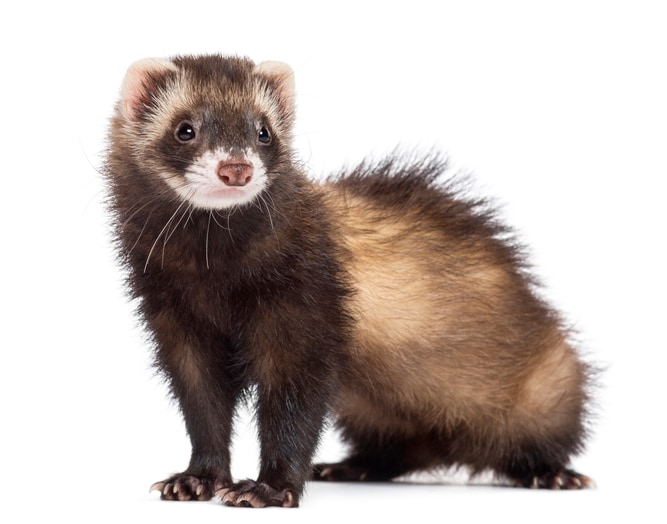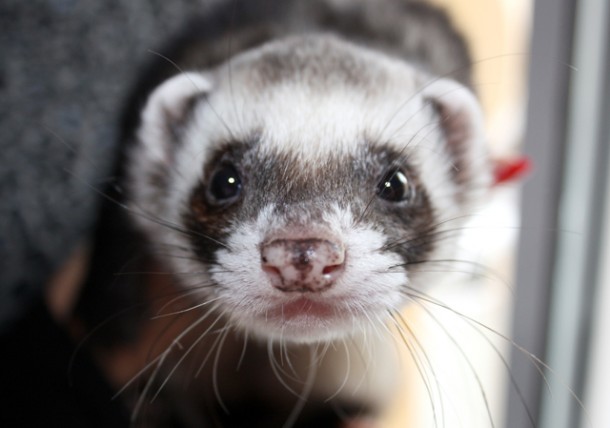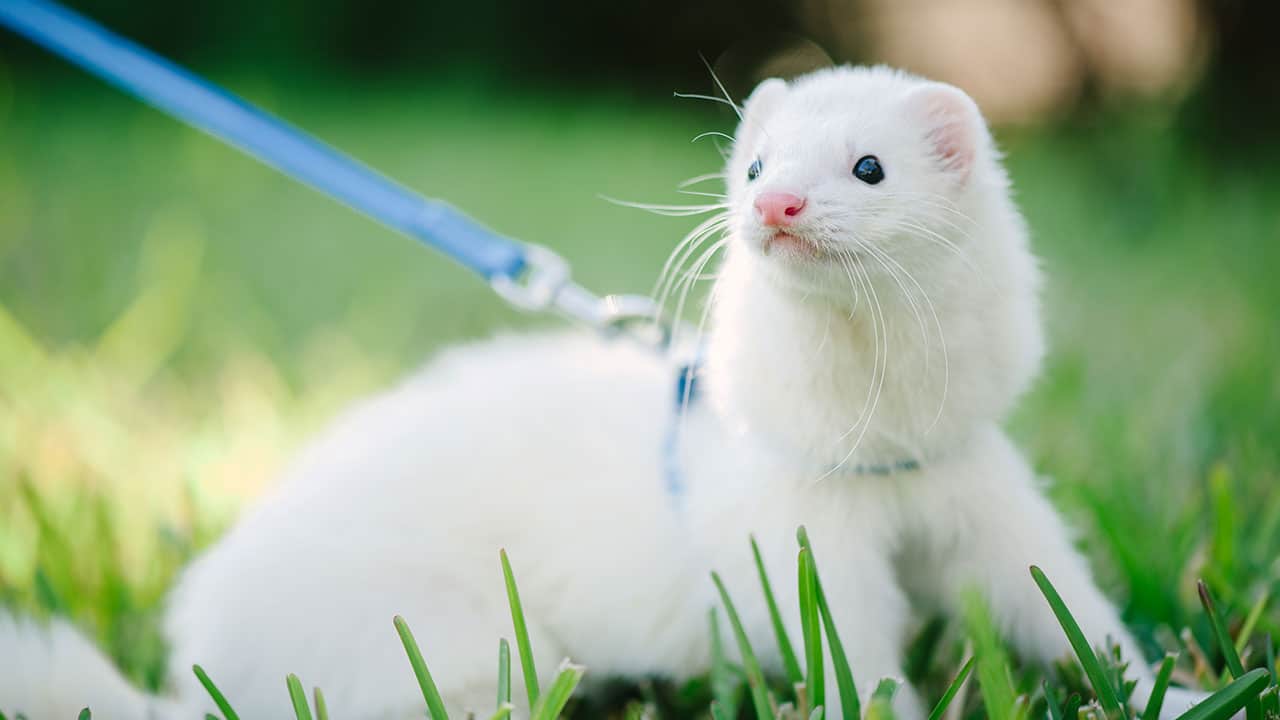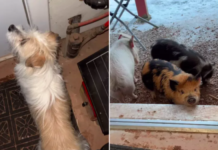Last Updated on July 30, 2021 by Fumipets
Badgers, wolverines, otters, mink, weasels, black-footed ferrets, and polecats all belong to the same Mustelidae family as ferrets. Although they are extremely closely related to the European polecat, the domestic ferret’s remote ancestors remain a mystery. The simple answer is yes, ferrets are domesticated. They’ve been domesticated for at least 2,000 years, and they were imported to America as pets as recently as 300 years ago.
Ferrets are fascinating pets to watch because they are lively. They’re bright and inquisitive, so they’ll need a lot of instruction and face-to-face contact. 1 A “business of ferrets” is a group of ferrets. Jills refer to female ferrets, whereas hobs refer to male ferrets. Kits are the young ferrets. Spayed females are known as sprites in North America, while neutered males are referred to as gibs. Before being sold in North America, most ferrets are spayed or neutered, as well as de-scented.
Temperament and Behavior of Ferrets
Ferrets are not entirely nocturnal, although they do sleep for a significant portion of the day and are most active around dawn and dusk.
They do, however, adjust their resting and activity patterns to accommodate their owners’ schedules.
Ferrets should be maintained in pairs or small groups in the ideal situation. Males and females of the same gender, as well as neutered males and females, maybe maintained peacefully together.
Furonem, which means “thief” in Latin, is the origin of the term ferret. Ferret owners will testify to the fact that this is a well-deserved moniker, as their pets would gladly steal whatever they can get their hands on in order to conceal it in their homes. Ferrets have a good sense of smell and hearing, but their vision is weak.

Ferret Accommodations
Most ferrets don’t mind spending time in a cage since they sleep for extended periods throughout the day. However, they should spend at least four hours each day outside of the cage. This means ferret-proofing your home, then ferret-proofing it again! These animals are intelligent and inquisitive, and they can squeeze into tight places that you may have missed. Ensure that your ferret has plenty of toys to gnaw on and play with.
Your ferret’s cage should have soft bedding on the floor.
Because these creatures are frequently intelligent enough to find out how to open latches and clasps, make sure the door has a strong double-secured lock. There should be no drafts near the cage, but it should not be overheated. Temperatures between 60 and 80 degrees Fahrenheit are optimal for ferrets.
Food and Water
Ferrets are obligate carnivores, which means they have to eat almost all of the time. These animals need an animal protein and fat diet since they cannot absorb nutrients from plants. Ferrets thrive on meat, eggs, and coldwater fish; sugary and high-fibre diets should be avoided. Ferrets should avoid grains since they are difficult to digest.
Because of their fast metabolism, ferrets must feed every three to four hours. Because food travels rapidly through a ferret’s digestive system, keep food readily accessible at all times; unlike many animals, ferrets seldom overeat. Make sure kids have access to non-chlorinated, fresh water at all times.

Typical Health Issues
The most frequent health issue in ferrets is probably adrenal gland illness.
Hair loss, vaginal irritation, itching, aggressiveness, and irritability are all symptoms of adrenal gland illness. Poor nutrition and a lack of UVB radiation are thought to have a role, and some experts think early ferret spaying (which is advised to avoid aplastic anaemia) may also play a part. Other potential health issues in ferrets should be diagnosed by your veterinarian, so keep track of any unusual symptoms.
Obstructions and other digestive problems: GGI issues are frequent in ferrets because they put items in their mouths that shouldn’t be there, including their own fur (which may cause hairballs). If your ferret is losing weight, having trouble eating, or not defecating regularly, this may be an indication of a potentially fatal gastrointestinal blockage. Make an appointment with a doctor as soon as possible.
Dental issues: Ferrets’ teeth are designed for ripping, and kibble isn’t up to the job. Ferrets, like people, may suffer from dental rot and cavities. Avoiding a trip to the dentist may be as simple as brushing the teeth (if you’re courageous enough) or giving appropriate chew toys. The only way to save a ferret’s tooth is to extract it. 3 A competent veterinarian should do this procedure.
Lethargy, weakness, and pale gums are typical signs of aplastic anaemia, which is a prevalent ferret illness. Female ferrets who have been in the heat without mating for more than a few weeks are in danger of becoming anaemic, which is why spaying female ferrets at an early age are advised.
Lymphoma in ferrets is a malignancy that affects the lymph nodes of the animal.
Unfortunately, it is nearly always deadly, and there are no therapies that can be used to prevent it.
Dilated cardiomyopathy in ferrets may result in abrupt death. The cause is thought to be a deficiency of taurine in the ferret’s diet. Simply stated, this condition is comparable to heart failure in that the animal becomes weak, sluggish, and wheezing. A veterinarian is required to diagnose this disease. Dilated cardiomyopathy in ferrets is treatable (if detected early), but there is no cure.
Rabies was previously a serious danger to ferret health, but due to an efficient vaccination, it has mostly been eliminated. Despite this, this deadly disease, which is extremely infectious to humans and other animals, continues to persist in certain areas. Watery eyes and facial irritations are common signs and symptoms.

Is it Legal to Have a Ferret as a Pet?
Make sure it’s legal to own a ferret in your area before you buy one.
Ferrets are still not legally recognized as domesticated animals in many areas, making them impossible to keep as pets. Some countries have prohibited ferrets and other exotic animals from being kept as pets.
In 1999, New York City enacted the notorious ferret ban, and the creatures are also prohibited as pets in much of California. Make sure you’re studying the domestic ferret and not its wild relative, the black-footed ferret.
Getting Your Ferret
If you do decide to have a ferret as a pet, make sure you deal with a reputable breeder that can provide you with records of your animal’s immunizations and health problems. It may cost a little more than buying from a pet shop, but you’re more likely to receive a healthy animal that has been well-cared for.

Odour and Ferrets
Ferrets have a bad image as odorous pets. They do have a distinct musky odour, but it isn’t unpleasant or overwhelming. This odour is produced by glands in the ferret’s skin and is there regardless of whether the ferret is de-scented or not. While taking a bath every now and then is good, doing so on a regular basis will not decrease the odour and may rather worsen it. 6 In order to fight the dryness of the skin, the glands generate more odorous oils.
Ferrets are often de-scented in North America, which entails the removal of the smell glands. Their smell glands resemble those of a skunk, and if they are attacked, they will release (rather than spray) the contents. Ferret scent gland secretions, on the other hand, are milder than skunk secretions, and the odour fades fast and is readily washed away.


















